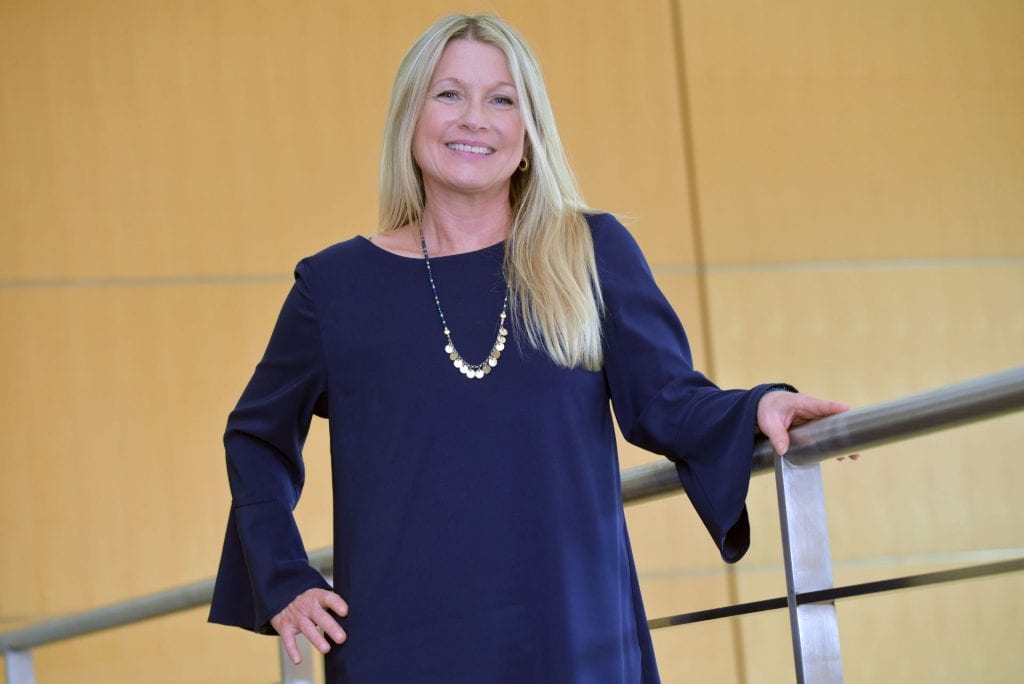When I think about the impact DePaul had on my life and career, I also go back to networks. DePaul expanded my perspective, my skill set, but perhaps most importantly, my network— a network I continue to leverage and grow today.
Marianne Markowitz (MBA ’92) is leading the launch of Illinois’ first new commercial bank in a dozen years. Called First Women’s Bank, the innovative, Chicago-based institution will serve small and midsize businesses and individual depositors, with a focus on women’s banking needs. Markowitz brings experience as the former Midwest regional director of the Small Business Administration to her role as bank CEO. In this interview, she shares why she is passionate about this groundbreaking bank startup, which is scheduled to open this year.
What motivated you to establish First Women’s Bank?
There is a well-documented and addressable gender gap in lending, but no one is addressing it. Women are starting businesses at two times the national average, yet they receive just 16% of conventional business loans. Our mission is to help bridge that gap, help grow the small-business economy and advance the role of women within it. That’s incredibly motivating to me!
What’s unique about this venture?
Everything! We’ll be the first de novo bank in Illinois in more than a decade and the only bank with a strategic focus on women in the nation. We have built an incredible team, and we’re guided and supported by a talented and experienced board. People are drawn to our mission to grow the economy and advance the role of women within it. The support we are receiving and the excitement this launch elicits continue to surprise me. It’s truly the opportunity of a lifetime.
What are the current challenges and opportunities facing small businesses in Chicago and beyond?
Historically, one of the biggest challenges facing small business was access to capital; now it’s about access to the right capital. Because larger banks tend to focus on larger, more profitable middle-market companies, the service levels for small businesses have suffered. As a result, a new crop of fintech ventures have emerged to fill the gap with fast cash. There are lots of providers offering immediate capital with opaque terms.
Small businesses are signing up for these loans without fully understanding the aggressive repayment terms, which can sometimes be predatory in nature. In addition, there are fewer trusted advisers to guide small businesses to the best capital solutions to meet their needs. While capital is one piece of the puzzle, a strategic network that can provide access to information, technology and marketing opportunities can be as powerful as capital. We intend to provide access to innovative capital solutions and connect our clients to networks of opportunity to help them achieve their goals.
How did your upbringing and education lead you to a career in business and public service?
I was raised in a working-class community, and I saw firsthand the achievement gaps that exist when there are few paths to consider and no networks to leverage. I’m a very commercial person, so I was drawn to business early on, I think, in part, because I saw so many different possibilities. That was exciting to me, and that ultimately led me to DePaul for my MBA and a career in finance.
A pivotal moment in my career came when I joined the 2008 Obama campaign as chief financial officer. It was the first time I had the opportunity to marry my skills with my passion and values. Once you experience leveraging the skills you’ve worked so hard to build with what matters to you most, then you are no longer working—you’re living your values. And that’s how I feel about the work we are doing at First Women’s Bank. We’re building more than a bank. We’re creating a platform that will allow small businesses, corporations and individuals to demonstrate their commitment to gender equality and women in leadership.
How did your DePaul education shape your career and life?
DePaul had a fantastic banking and trading focus. At the time, I was working on complex trading instruments, so it was great to go to school at night and immediately go back to work the next morning and apply what I was learning. It was at DePaul that I focused on banking for the first time. In fact, we had a project where we had to design an innovative bank from scratch, and my team designed a mobile bank. I’ve thought about that project a lot as we prepare to launch a mobile bank. The technology is dramatically different, but the fundamentals are not.
When I think about the impact DePaul had on my life and career, I also go back to networks. DePaul expanded my perspective, my skill set, but perhaps most importantly, my network— a network I continue to leverage and grow today.
What advice do you have for recent DePaul graduates?
My advice is to leverage the broad network that DePaul offers. Broaden your perspective, look beyond your current job or area of study. Look up, look across, look around at the many paths that DePaul can help lead you down. See your professors not only as teachers, but as advisers for your future. And find a way to marry your skills and experience with your passion.
By Robin Florzak | Photo by Kathy Hillegonds


